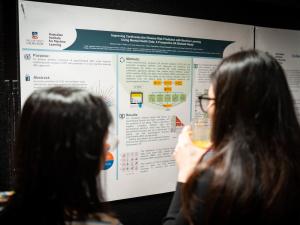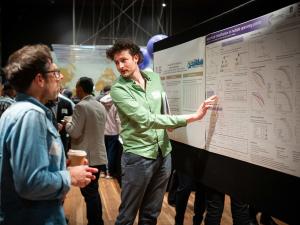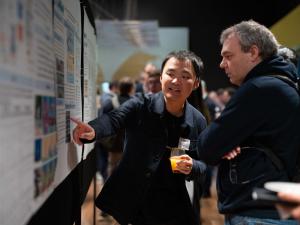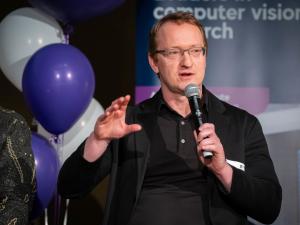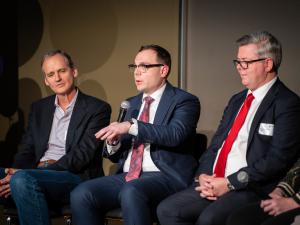Australia’s AI capital opportunity - AIML Research Showcase 2023
By Kurtis Eichler
More than 100 people from across South Australian government, business and industry have come together to get a rare insight into the latest in responsible artificial intelligence (AI) research.
Politicians, professors, and corporate leaders gathered at the AIML Research Showcase 2023 last week.
The annual event allows AIML researchers to share their work with a broader audience, with this year’s showcase focusing on responsible AI: what it means, how it works, and how AIML is supporting its growth in Adelaide.
Opening the showcase, AIML’s director, Professor Simon Lucey, said it had been “such a breathtaking year in terms of what’s been happening in AI”.
Professor Lucey said he hoped people would come away with a deeper understanding about what makes AI exciting and what economic opportunities South Australia could reap.
“The thing that I feel really privileged about is that Adelaide is one of the hot places, not in Australia but on the planet, in terms of what is happening in this field,” Professor Lucey said.
“We're really pushing the envelope in foundational problems, pushing the envelope in applied problems, in vision-and-language, and we’re really branching out to work with brand new partners and create opportunity.”

AIML Operations Manager Dr Kathy Nicholson
In the headline panel session chaired by AIML operations manager Dr Kathy Nicholson, Professor Lucey joined Robotics Australia Group’s Dr Sue Keay, CSIRO Data61 director Dr Jon Whittle, Google Research Australia’s head Professor Peter Bartlett, Commonwealth Bank’s CIO for Technology Brendan Hopper, and South Australian MP Michael Brown, exploring responsible AI, including its impact on workforces.
Asked about what changes were needed to translate top tier research to complexify the economy and build a world leading industry in Australia, Michael Brown MP, the Member for Florey, said it was important to build AI literacy and skills broadly across the whole community.
“If South Australian students… have that exposure to AI, they’re more like to want to be the researchers of the future, and they’re more likely to pursue a career in this field.”
“I think it is possible for South Australia to be a world leader in this field, and that’s something all of us who have a stake in it need to make sure that we do our best to make it happen.”
Mr Brown is also leading South Australia’s Parliamentary Select Committee on Artificial Intelligence which will explore the technology’s development, deployment and application across various sectors, and the potential for the state to develop a competitive advantage in AI.

Michael Brown MP
Asked about how AI was impacting workforces and how they were preparing for future disruptions, Dr Keay said human resources, capability, and talent managers needed urgent access to reskilling.
“Fifteen years ago, when we started introducing autonomous load haulage vehicles, or big robot trucks, it was recognised that that meant that there would no longer be a role for truck drivers,” Dr Keay said.
"The mining industry actually worked with TAFE to develop a whole bunch of courses so that people could retrain as field technicians… so that people could understand what it was like to work in a remote operations centre and run equipment autonomously.”
On the importance of partnering with academia, Commonwealth Bank’s CIO for Technology, Brendan Hopper, said working with leading research institutes allowed the bank to gain access to the smartest minds to build the best products for their customers.
“We’re never going to be in the business of inventing our own AI algorithms (or) being a university, we understand that we’re not a part of that ecosystem—but we want to partner with it to make sure we’re accessing the best tech as quick as we can,” he said.
Hopper added the Lot Fourteen innovation district had amazing “ingredients” for tech industry.
“I think South Australia and Adelaide has an amazing opportunity to really be the AI capital of Australia.”
Dr Whittle said that Australian industry, universities and governments needed to partner to help spark innovation if Australia was to maintain its status as an AI leader.
“We’re a small country—26 million people—and we’ve actually got phenomenal AI research expertise,” Dr Whittle told the panel.
“We do really, really well, but to maintain that, and in particular to be able to translate that research into practice and innovation which is where we typically are a lot weaker… we need to partner up.”

Head of Google Research Australia Professor Peter Bartlett
Professor Bartlett agreed that industry partnerships, like those AIML has forged through its SME engagement program, are essential if Australia is to build a world-leading AI industry.
“I would just emphasise the connection part. I think really seeing what you have here as something that could be a beacon for Australia in general… what South Australia can do for Australia in this direction I think this is hugely important,” he said.
“I guess making those partnerships happen not just within Australia but more broadly around the world I think is really going to be key.”
The showcase also included presentations from Dr Tony Lindsay, director of STELarLab, Lockheed Martin’s national research and development hub; Professor Anton van den Hengel, director of the Centre for Augmented Reasoning; Professor Dino Sejdinovic of the School of Computer and Mathematical Sciences; and Professor Lyle Palmer of the School of Public Health; as well as a selection of talks and poster presentations from AIML early and mid-career researchers and PhD students.
The AIML Research Showcase 2023 was held at the Australian Wine Centre on 16 August 2023.


